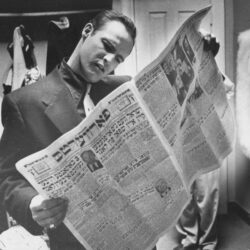| Source (Hebrew) | Translation (English) |
|---|---|
רִבּוֹנוֹ שֶׁל עוֹלָם, חֲכַם הָרָזִים לְפָנֶיךָ עוֹמְדִים נְבוּכִים, אַךְ נוֹעָזִים כִּי בְּפָּרָשַׁת אַחֲרֵי מוֹת עַל תּוֹעֲבוֹת קוֹרְאִים וְאֶחָד מִכָּל מִנְיַן, נָשִׁים וּגְבָרִים, שׁוֹמְעִים אֶת הַפָּסוּק ”וְאֶת זָכָר“ וּבוֹכִים בְּפַאֲתֵי בָּתֵי כְּנֶסֶת מְנֻדִּים וּשְׁבוּרִים. |
Master of the Universe, to Whom all secrets are known, Before You we stand both confused and undaunted, In parashat Aḥarei Mot, Abomination! is spoken and one out of ten, women and men, Hear the words “V’et Zakhar” and weep In the farthermost pews, Outcast and broken. |
זְכֹר נָא ה׳ בְּקְרִיאָתֵנוּ עַתָּה הַנְּפָשׁוֹת הָרַבּוֹת עוֹד מִיָּמִים יְמִימָה שְׁגִּלּוּ בְּלִבָּם זִיקָה עַזָּה לִבְנֵי מִינָם, אַהֲבָה אֵיתָנָה. |
As we read these words now, God remember in truth The myriad souls, who from their youth, Found in their hearts a fierce connection, A mighty love, toward members of their own sex |
זְכֹר נָא ה׳ אֶת פַּחְדָּם הַמְּשַׁתֵּק אֶת חֶרְפַּת הַחִבּוּק וְחֶרְדַּת הַמִּשְׁתּוֹקֵק. שָׁפְטוּ אֶת עַצְמָם בְּכָל תֹּקֶף הַדִּין כִּמְחֲיָּבֵי מִיתָה עַל עִווּת הַמִּין. |
Remember O Lord their paralyzing fear, The terrifying longing, the shaming embrace. Accusing themselves with the full force of Law Of perversions that could only be remedied by death. |
זְכֹר רְבָבוֹת בְּבוּשָׁה הִתְאַכְּלוּ הוּקְעוּ כְּתוֹעֵבוֹת אוֹ בְּסֵתֶר סָבְלוּ. לֹא הֶעֱלוּ בְּדַעְתָּם בִּמְקוֹם הַקְּלָלוֹת לְבָרֵךְ ”בָּרוּךְ … מְשַׁנֶּה הַבְּרִיּוֹת“. |
Remember the thousands consumed by shame, Cast out in outrage, or suffering unseen. Not one dared imagine that rather than cursed They were blessed by the One, Who varies His creatures. |
מָרֵיהּ דְּעַלְמָא, הָאִם וְאֵיךְ ”דִּמְעַת הָעֲשֻׁקִים“ עָלְתָה עַל לִבְּךָ? הַיִּתָּכֵן שְׁתּוֹרָה בִּקְּשָׁה לְהַחֲרִים בָּנוֹת אֲהוּבוֹת, בָּנִים אֲהוּבִים? |
Master of the universe, Why? And have the tears of the oppressed made it through to Your heart? Can it be that the Torah demands we cast out Beloved daughters, beloved sons? |
אִם אֵין לָהֶם כֹּחַ וּבְלֹא מְנַחֵם הְיֶה אַתָּה נֶחָמָה עֲבוּרָם וְתִפְלָטֵם שִׂים שָׁלוֹם בֵּינֵינוּ וּבְלֵב חֲכָמֵינוּ נְדָבָה וּמִשָׁמַיִם תַּעַזְרֶנּוּ לְתָמְכָם בְּאַהֲבָה |
If they have no power and no redress, Then be Thou their comfort, their strength and fortress. Bless us with peace, and our sages with tenderness. Grant us strength from on high to uphold them in love, |
אַנָּא הַעֲנֵק לְכֻלָּנוּ תִּקְוָה לְחַיִּים שְׁלֵמִים וְלִישׁוּעָה קְרוֹבָה |
Be generous with the gift of hope from above, For life and wholeness your salvation is at hand. |
A “Prayer to be Recited Before the Reading of Aḥarei Mōt (Leviticus 16:1–18:30)” was first published by Rabbi Steven Greenberg in a blog post in the Times of Israel on 1 May 2015. He wrote:
I have written a short prayer. It will not be right for every shul. It may not go far enough for some and will be too bold for others, but perhaps it is a way to start a conversation with the kid in the back row, that for the first time feels in the recognition, a glimmer of hope. If this prayer is too explicit or not in line with the vibe of the shul, don’t read it. Do what is appropriate…but do something. Because it’s not OK to be silent when people are hurting.
Vocalization by Aharon Varady with help from Baruch Sienna and Oren Steinitz.

“תפילה קודם קריאת פרשת אחרי מות | Prayer to be Recited Before the Reading of Parashat Aḥarei Mōt, by Rabbi Steven Greenberg” is shared through the Open Siddur Project with a Creative Commons Attribution-ShareAlike 4.0 International copyleft license.










Leave a Reply